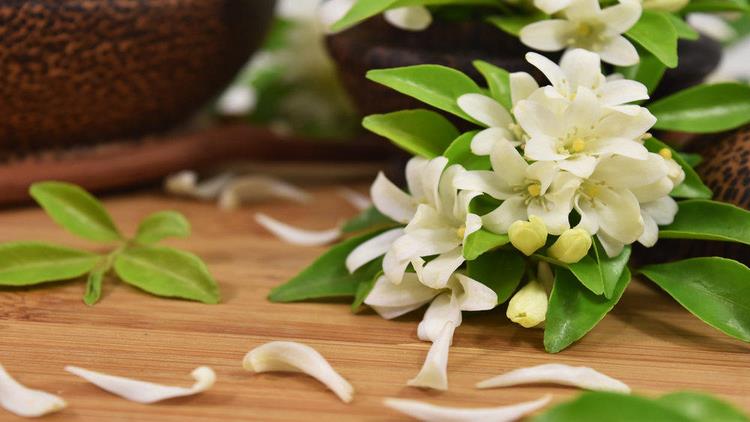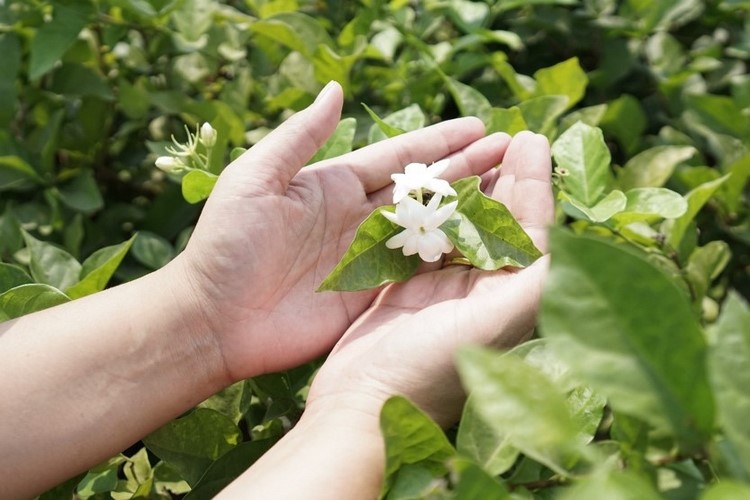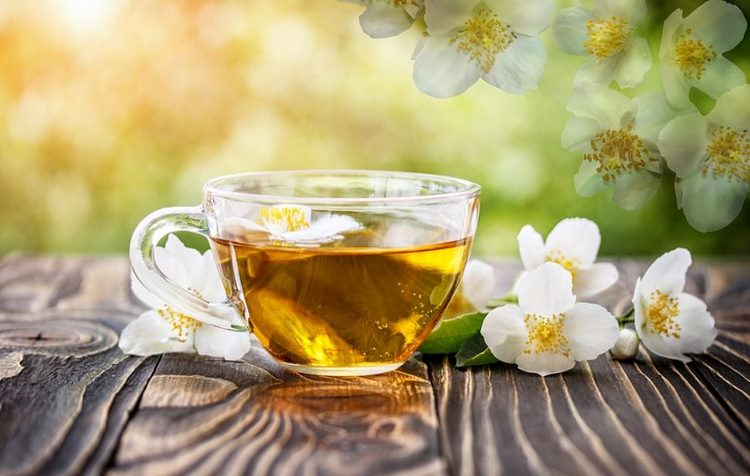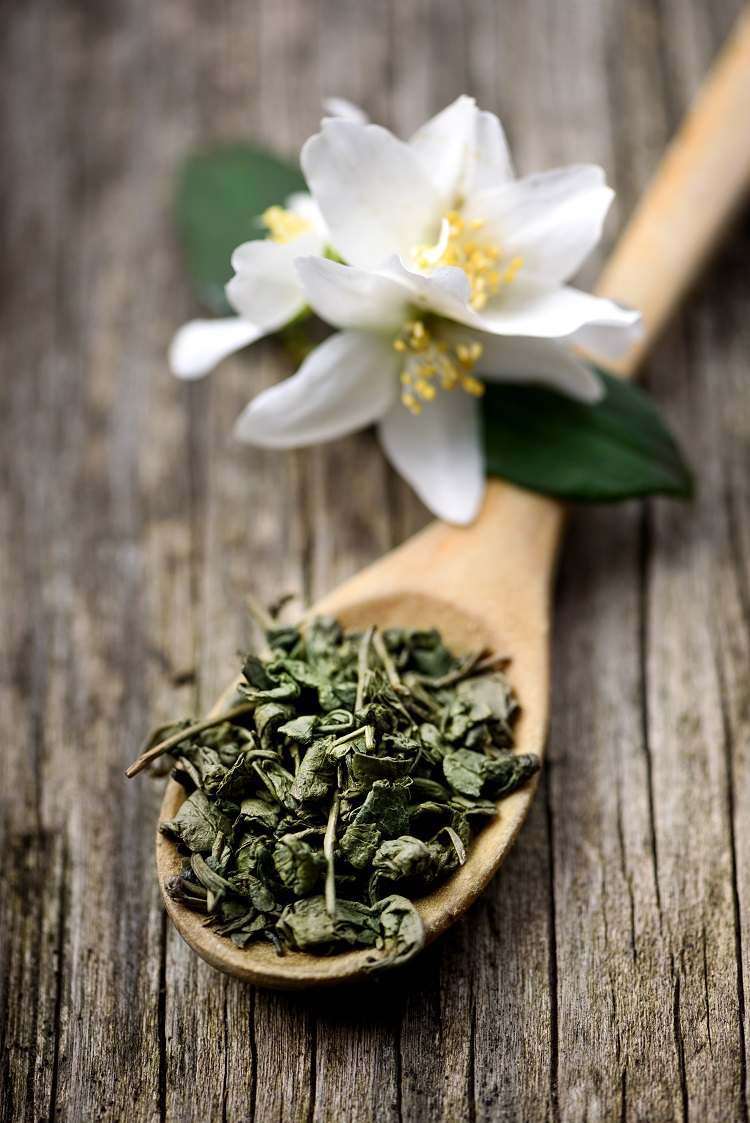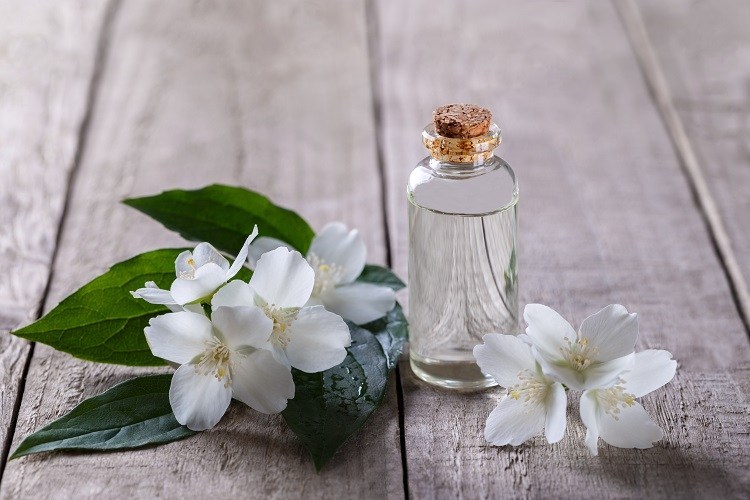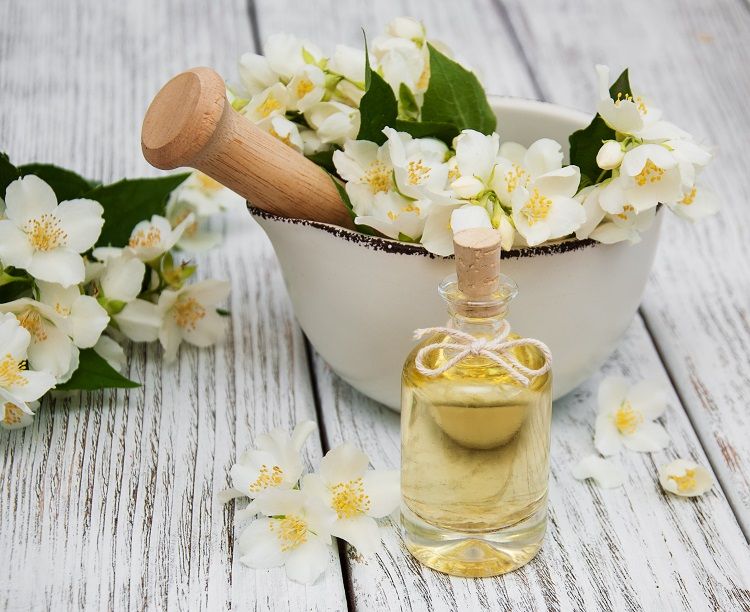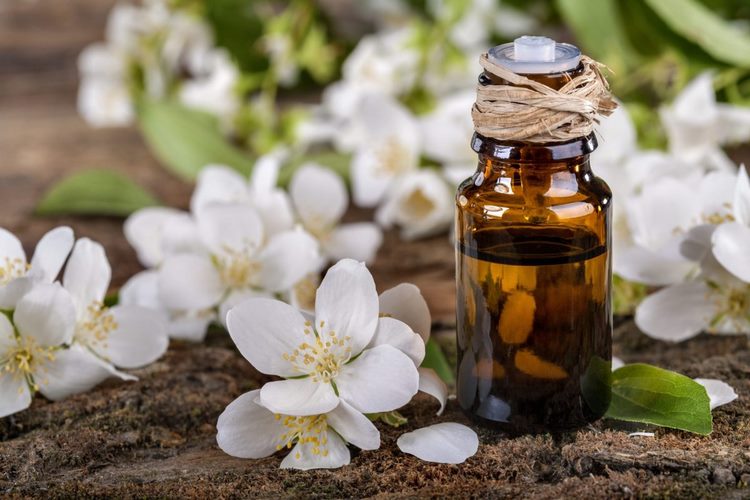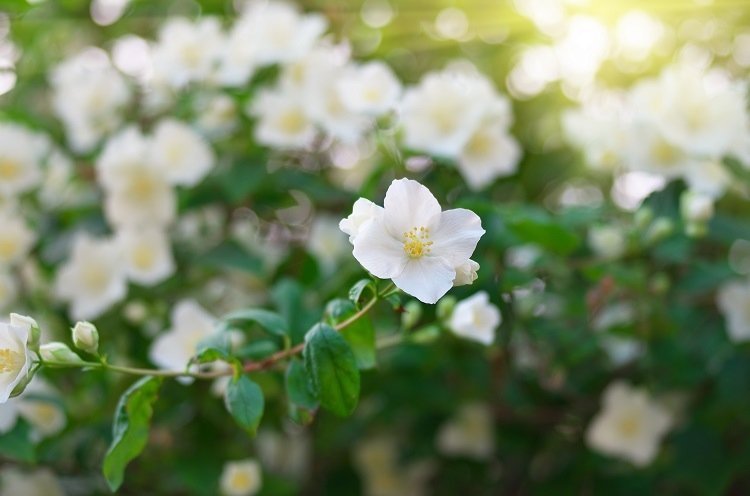What are the benefits of jasmine for health and how to use it? Jasmine is a shrub of the olive family with white star-shaped very fragrant flowers. It blooms from April to late autumn, and flower collection begins in July and continues until October. Jasmine flowers bloom at night, so they are picked either in the dark or early in the morning. In addition, after collection, the flowers should be processed as soon as possible (within an hour), as the raw material quickly fades and loses most of its unique properties. Aromatherapy experts claim that the highest quality oil is produced in Japan and China, as well as the United States, Italy, France and Morocco. Jasmine essential oil is one of the most fragrant and has many beneficial properties. It has long been known that the aroma of jasmine enhances the romantic mood and in the East it was called “Moonlight of Love.”
Composition and beneficial properties of jasmine
Jasmine is interesting not only for its beauty and fragrance. It contains essential oil, various acids like salicylic, benzoic, formic. Salicylic acid and its esters have an excellent anti-inflammatory effect. Jasmine has a relaxing effect, its flowers reduce both headache and abdominal pain. It is recommended for women to facilitate contractions. It is used orally for hepatitis and cirrhosis.
Jasmine essential oil has many healing properties. The smell awakens sensuality, promotes on creativity, increases self-confidence, relieves stress, relieves migraines pain and enhances lactation in nursing mothers. Jasmine essential oil is often used during meditation, as it helps achieving maximum relaxation, emotional and spiritual peace and harmony in the soul.
This essential oil has a beneficial effect on the nervous system. It is advisable to inhale its aroma in case of neurosis, insomnia, increased nervousness and irritability, depression, stress. In addition, it is a great anesthetic and disinfectant, aphrodisiac, it has antidepressant properties and is a great remedy for treating skin diseases and conditions, helps to slow down the aging process and improves attention and memory. Experts recommend the use of jasmine oil in aromatherapy and for external use in:
- depression, headache and insomnia;
- ovarian problems and other gynecological diseases;
- diabetes;
- thyroid problems;
- eczema and dermatitis;
- sexual dysfunctions in men and women;
- radiation damage to the skin.
Benefits of jasmine – Why it is good to drink tea?
Having discovered the benefits of jasmine, people began to seek application for the plant. Jasmine is often used in culinary for its rich pleasant aroma. Most often, jasmine petals are added to drinks and various desserts. This gives them a delicate, refined taste. Young jasmine leaves can be used as a seasoning for salads.
The combination of fragrant jasmine with green tea is especially popular. Jasmine tea is easy to prepare at home. You need to mix dry jasmine flowers with black or green tea. The essential oils of jasmine give the flowers a subtle, but bright, memorable aroma that is fully revealed in tea. Tea with jasmine has an invigorating effect and optimizes metabolism. The tea cleanses blood vessels, removes toxins, burns excess fat. By activating the brain, jasmine tea is especially useful for schoolchildren, students and researchers. Being an excellent antidepressant, jasmine tea will relieve anxiety, fatigue and bad mood. Rich in antioxidants, tea protects the skin, facilitates drainage and promotes blood circulation. With its relaxing effects, it is an excellent remedy for sleep disorders and migraines.
How to use jasmine essential oil?
Along with lavender and rose oils, jasmine essential oil is legendary and for thousands of years it has been used for perfume compositions as well as for cosmetic and healing products. Jasmine essential oil is considered one of the best care products for dry, thin, tired and injured skin. When added to a cream, mask, makeup remover or tonic, it helps skin cells renew faster, smooths out fine wrinkles and eliminates redness, itching, peeling, a feeling of increased dryness and excessive tightness. Since the oil has strong antioxidant properties, its regular use protects skin cells from the damaging effects of free radicals, prevents the appearance of wrinkles, improves complexion and evens out the skin surface. Many beauty salons use jasmine essential oil for hair care. It not only adds a lovely aroma to masks and balms, but also nourishes, strengthens and restores the structure of hair. Here are some ideas how you can use jasmine essential oil at home:
Homemade skin and hair care products – Jasmine essential oil can be added to face, hand and body creams, shampoos, conditioners and ready-made hair masks, shaving gels, bath foams, etc. Shampoo or conditioner with jasmine improves the structure of the skin and hair, relieves dryness, nourishes your hair and protects it from damage. You can prepare an easy mask to restore damaged hair. Add 2 drops of jasmine oil to 2 tablespoons of olive oil. Intensively rub the resulting composition into the roots, and then thoroughly comb the hair with a wooden comb.
Massage oil – Massage with jasmine essential oil is a great way to relax and relieve stress. In addition, the skin will acquire additional velvety, softness and will be perfectly moisturized. Since jasmine is a recognized aphrodisiac, a massage with this oil normalizes the sexual functions of both men and women, increasing potency and libido. You can use any massage oil, for example coconut, apricot, grape seed. Add 3-4 drops of jasmine oil to massage oil immediately before the procedure.The resulting composition is rubbed between the palms of the hands and applied to the massaged areas of the skin. Before using jasmine oil to massage your skin, it is important to dilute it with a neutral vegetable oil. We remind you that the direct application of pure essential oils on the skin is not recommended.
Aromatherapy is an ideal way to add aroma to rooms and therapeutic procedures at the same time. Add 2-3 drops of essential oil to the water for the lamp, light a candle – and your remedy is ready. It is best to use it in the bedroom before going to bed as jasmine essential oil relieves stress.
Bathtubs with jasmine essential oil have beneficial effects on the skin, especially over-dried and irritated. A bath with jasmine oil relaxes, cleanses the body and soul from negativity, relieves stress, reduces headaches, and promotes good sleep. Add the oil to a spoonful of cream, whole milk, honey, bath foam since pure essential oils do not dissolve in water. For one procedure you will need only 3-4 drops of jasmine oil per bath. If there is no opportunity to take a bath for some reason, then foot baths or hand baths have the same properties for the body. They improve skin regeneration and are especially useful before manicure and pedicure. For 2-3 liters of water, 1-2 drops of essential oil will be enough.
Who should not use jasmine essential oil? People with low blood pressure, gastritis, with various pathologies of the kidneys and people with individual intolerance to aroma or allergies to this plant should not use jasmine essential oil. It is not recommended to install a flowerpot with jasmine in the nursery. During pregnancy, jasmine should not be used only during the first 4 months. The essential oil can be used only after diluting it in a vegetable or other base oil. The proportion is one drop of jasmine oil per 10 drops of the base.
Today you can find both pure oil which is more expensive and already diluted essential oil from jasmine petals. Before purchasing, carefully read the composition and method of preparation, because the prices of these oils are completely different. The essential oil is unique because its aroma not only perfectly combines with other essential oils, but has the ability to bind even the strongest and harshest odors into a single ensemble. It works in a great way with other essential oils – black pepper, rose, lemon, sandalwood, mint, neroli, cedar, marjoram, etc.

